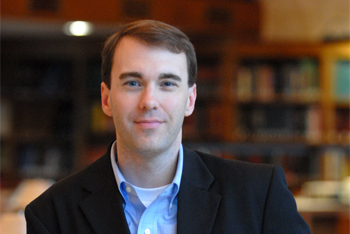Editor’s note: As the Christian landscape changes, leaders must ask and answer a new question: What’s the future of denominations? This interview is part of an occasional series that offers insight on this vital issue. To see the entire series, click here.
The church is all about community, said the Rev. Michael T. Kontogiorgis, assistant chancellor of the Greek Orthodox Archdiocese of America. As technology increasingly isolates us, the challenge is to strengthen interpersonal relationships. Kontogiorgis says that the emphasis of the Orthodox Church is, first and foremost, on corporate worship, coming to church together to glorify God and to be nourished.
Prior to being appointed assistant chancellor in 1998, Kontogiorgis served with the Annunciation Cathedral in Boston, the Holy Trinity Greek Orthodox Church in Orlando, Fla., and as chancellor of the Diocese of Pittsburgh. He received his master of divinity and master of sacred theology degrees from Holy Cross School of Theology.
Kontogiorgis spoke with Faith & Leadership recently about modern challenges to the Orthodox Church. The video clip is an excerpt from the following edited transcript.
Q: How do you see the future of denominations?
For a century or more we’ve been involved in the ecumenical movement; we feel strongly that Christ didn’t intend for us all to be broken into so many divisions. The early church faced a common struggle. Paul said, “Stop saying you follow me or you follow Peter. No, we’re all following Christ.”
The church in this country is facing some different struggles than it faced when I was growing up in the ’50s and ’60s. We never questioned authority. Whatever an authority figure said, that was it. Things have changed. We question authority. We question teachers. We question our priests. Fifty years ago, a priest of ours would be accepted at face value, whereas now people want to know why. When we can’t feed them, then they become hungry and they start looking elsewhere for answers.
The challenge is to rediscover interpersonal relationships. You would think that’s easier in this day and age with the communication vehicles that we have available -- the Internet, instant messages and Facebook. But that’s actually becoming more of a challenge, because we’re isolating ourselves from one another.
We’re becoming isolationists, and the church is all about community -- being together, worshipping together and helping each other to help people. That’s going to be a challenge for the church in the next decade or two, because technology’s going to keep evolving.
Q: What does the church do, then?
The church is always going to be around. It’s been around for 2,000 years. It’s going to be around till the second coming, but the challenges in nourishing our people are different than they were even 10 years ago. There’s always faith, but we’re losing sight of how love translates into day-to-day life, because we’re withdrawing from day-to-day life with telecommuting.
Q: When you say the church is going to be around for the second coming, does it make a difference which denomination people are part of?
For me, as a Greek Orthodox priest, I would say that Christ challenged his disciples to follow what he taught them, and we hope and believe that we are doing that. Our ordinations trace back to the apostles. Where our church emanated from is where Christianity was born. If Christ gave his disciples a road map and said, “This is the way to go,” and that was passed on, then that’s what we should be doing.
I want to do what I need to do to inherit salvation, and if this is the road map that he instructed his disciples to pass down, I’m going to try to follow that road map.
How many times have you been traveling somewhere and there’s a sign for the airport, but if you take that road, it’s not exactly the way you want to go? Once I had three [GPS systems] on my dashboard because I was checking one against the other. They told me to go different ways that were all going to get me there. When I finally figured it out, I preferred one way as opposed to the other two ways -- it’s the same thing with belief. We feel that this is the most appropriate way and there are guardrails to help us stay on that road.
Q: Are there positive as well as negative aspects to the increasing use of technology?
Centuries ago when people brought donations to the church, they brought their first fruits, either grapes or chickens. Cash was not the cash we’re used to. Nowadays, we’re using credit cards and debit cards all over the place. Back eight years ago, we were encouraging some of our churches to go with this electronic way of paying.
In my particular diocese we offer Sunday services on the Internet. Is it the same experience? No, because it’s not a community experience. But if you can’t leave your house or … I had an attorney during Holy Week who watched one of the evening services on his computer in the office while he prepared for a hearing the next morning. He couldn’t have done that if we weren’t broadcasting over the Internet.
We’re trying to take advantage of the technology to make it easier for people. Now, do some people say, “I’m going to stay home Sunday morning and just turn on the computer and watch it?” Yeah, I’m sure people do, but at least they’re turning it on as opposed to reading the Sunday paper and having breakfast and going out to shop or whatever.
Q: What do you see as a challenge to the Orthodox Church in the United States?
One of our struggles is because the church was brought here not by missionaries but because of ethnic groups migrating to the United States. The Greeks and the Russians and the Antiochians and others -- they all came to this country. And then when they got here (a century ago, when immigration from Europe was at its high point), they felt the need for the church. So they sent back to their homelands for priests, for bishops, to come.
That’s how our church came to this country. There were a couple missionary efforts taking place in the country and also in Alaska, but by and large, the church was brought to the country by the early immigrants. And they brought the church that they knew from back home. So we have a very strange thing that occurred in this country: we have a dozen or so Orthodox churches that are ethnically tied back to their homelands, and it’s probably the only time in history where we didn’t have the local church evolving.
We’ve been trying since the early ’60s to have all these ethnic-based Orthodox churches work together in many activities. We have a social outreach program, among other things, that we do as a group, but administratively we are independent of one another.
Same faith and all, but we have our own bishops. We have our own structure. We function independently of each other. There’s been a movement for decades to try to have a common administrative structure. One, it’s always been the way to do it. Secondly, it’s much more efficient and cost-effective to have one administrative structure than to have a dozen administrative structures, and also to make it easier for us to do outreach to people.
We have converts coming into the faith, either because they’re marrying our own parishioners or because they’re discovering the Orthodox Church. So which church do they go to? Which of these ethnic churches? Again, there have been efforts over the decades to bridge that gap and to try to work toward that end. When will it happen? I’m not sure, because it’s very difficult for people to give up what they have.
I know a story someone told me years ago that in his hometown there was no Greek Orthodox church but there was a Russian Orthodox church. And he went to the Episcopal church, because he didn’t want to go to the Russian Orthodox church. Which is the same faith as ours, but for some strange reason, he felt not comfortable going to that church but went to the Episcopal church, which is not exactly the same faith in dogma, in doctrine and belief as the Russian church would be to us.
It tends to sometimes fall along ethnic lines. I couldn’t logically say, “Why wouldn’t you go to the Russian church, because it’s the same faith, and you could take Communion there and you could participate?” It just wasn’t something that he would even have considered.
Q: Are issues in the Orthodox federation of churches analogous to denominational issues in the Protestant churches?
It’s like the United States. North Carolina has a different tax code than South Carolina than New York. You’ve got your own peculiar laws here, but you’re all part of the United States. What binds all of our states together is the federal government, but the federal government doesn’t impose a uniform way of doing things to each and every one of the states, with exception of things like interstate highways.
Our churches believe in the same dogma. Centuries ago the Serbian, the Russian and the Greek Orthodox churches found that each locality had its uniqueness, its own peculiarities, needs and issues; the church evolved ethnically. It was a lot easier for the church to work on a national level as opposed to crossing national boundaries.
For instance, when it comes to fasting, the church in Greece has a prohibition about eating olive oil. The church in Russia doesn’t. Historically, it makes sense, because olive oil was a staple in Greece. It wasn’t such a big deal in Russia, so it never evolved to be an issue for them.
Those things have nothing to do with salvation and belief in the dogma of the church. They’re just different ways of approaching things. We’re a federation of churches that believe the same things about Christ and salvation, but we function on a local level and we can make decisions locally just as North Carolina can make decisions about how the state is governed.
Q: Are there particular lessons that the Orthodox tradition might have to offer on the future of denominations?
First and foremost, our emphasis is on corporate worship, coming to church together to glorify God and to be nourished, both in words and through the sacrament of the body and the blood of Christ. We emphasize community -- one priest, one church, one community. They all gather together, and we don’t divide the parish into smaller groups. We gather as a group, as a family together. That goes back to the early church.













